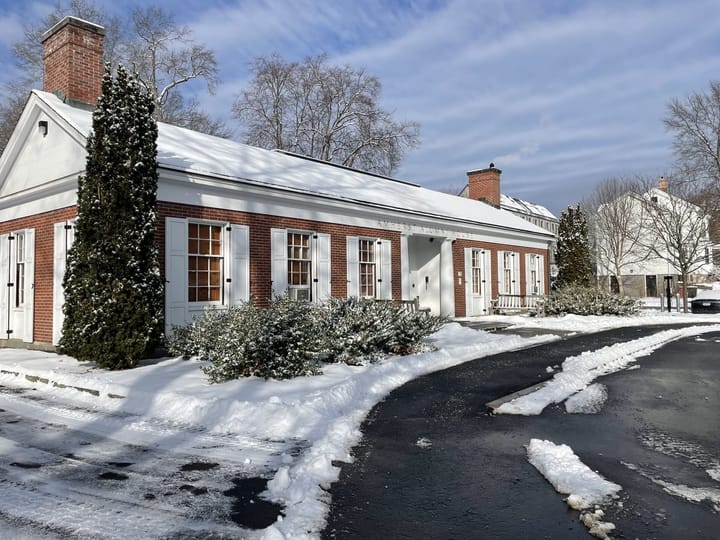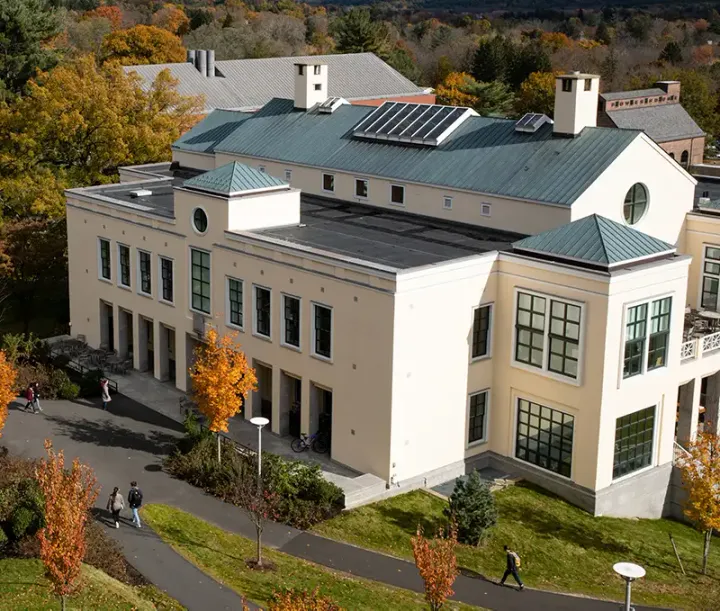Honoring Stonewall, College Launches LGBTQ+ Event Series
President Biddy Martin’s house was decked with pride flags for the Stonewall Committee’s inaugural event, the Stonewall at 50 Soirée on Oct. 16. The Stonewall Committee invited members of the college community to the soirée to launch a year of programming by the committee.
The Stonewall uprising was a clash between police and patrons of the Stonewall Inn, a New York gay bar. Engaging in homosexual behavior was illegal at the time, so police raided the bar and roughly arrested patrons and employees. The event sparked six days of protests and riots, and ultimately served as a catalyst for the LGBTQIA+ rights movement. To engage with the legacy of Stonewall, the Stonewall Committee will host events focused on the LGBTQIA+ community throughout the rest of the semester.
The Stonewall Committee is comprised of students, faculty and staff dedicated to “celebrating and recognizing the 50th anniversary of the 1969 Stonewall rebellion,” according to co-chair Jxhn Martin, director of the Queer Resource Center. Gabe Hall, assistant director of international student engagement, co-chairs the committee with Jxhn Martin. The Stonewall Committee aims to center marginalized voices, especially queer and trans people of color, through its programming in order to “showcase the richness and complexity of the Stonewall rebellion,” Hall said. As part of that mission, the co-chairs began the Stonewall soirée with a land acknowledgement before discussing the events of Stonewall.
The first meeting of the Stonewall Committee took place last semester in early April. The committee sought to bring in voices from multiple different groups on campus, as well as from people with diverse backgrounds of academic knowledge. The goal is to build community across the entire Amherst community.
The Stonewall at 50 Soirée was open to all members of the Amherst College community, and numerous faculty, students and staff attended.
President Biddy Martin, who was the main speaker of the night, said that she had rarely been as excited as she was that day to host a “gay soirée.” She praised the work of the Stonewall Committee and the many LGBTQIA+ scholars in the room.
“There is so much variation in the embodiment of gender and sexuality,” Biddy Martin said, who is not related to Jxhn Martin. “Why anyone still feels that they should contest that is beyond me.”
Biddy Martin joked that when Stonewall occurred in 1969, she was “not in a gay bar in Greenwich village — but unlike most of you I was alive.”
Growing up in the 60s in a “very bigoted household,” she said any hint of queerness was cause for “murderous rage.” Her family knew she was queer, and they saw it as a problem. Now, she said, there has been so much change and progress, though it may not be even or linear.
Biddy Martin noted, however, that the LGBTQIA+ rights movement still has a long way to go, referencing the employment discrimination case currently under Supreme Court review. The Supreme Court heard three court cases on Oct. 8 on the topic of whether Title VII of the Civil Rights Act protects gay and trans people from employment discrimination. A decision is expected by June 2020, when the current Supreme Court term ends. “We are going to have to fight on to get back what is being eroded,” Biddy Martin said.
But she doesn’t want students “to have to fight at Amherst College.” Biddy Martin said she recognizes that there are phobias and forms of discrimination present in the Amherst community. “We will fight back together,” she said. “Be proud of who you are.”
“It takes a huge amount of support to get through,” she added about the traumas of enduring homophobia from her own family. She encouraged everyone to uplift each other and not allow themselves to become divided. In keeping with the mission of the Stonewall Committee, Biddy Martin emphasized that many groups were at the forefront of the movement, including trans women, gay men, lesbians and people of all races. She warned against highlighting one group in order to suppress another but urged people to “insist on their rights” if they were part of a group that gets the least support or recognition.
She then encouraged people to come forward if they experience discrimination so that she and the administration can rectify it. “Don’t assume that the administration doesn’t care. I care. And so does everybody else I know,” she said. With a “eat, drink and be gay,” she closed her speech to a rousing applause and laughter.
At one point, Biddy Martin asked the crowd, “Would you have thought an out lesbian would have been hired as the president of this college?” For much of Amherst’s history, the answer would have been no.
A thesis project by Eric Thalasinos ’02 details the history of gay rights at Amherst from the 1950s to 2001. In the 1950s when Amherst College was all-male, several gay faculty members were harassed or fired for suspected homosexual behavior. Decades passed before the first support group for gay and bisexual male students was formed in 1977, although no women’s group existed at the time. When women began attending Gay Alliance meetings in 1980 after the college became co-ed in 1975, the group changed its name to Gay and Lesbian Alliance.
Another significant milestone was the establishment of the women’s and gender studies department at Amherst. Eve Sedgwick, who was a notable scholar in gender studies and queer theory, helped create the department during her time teaching at Amherst from 1984 to 1989.
Upcoming events hosted by the Stonewall Committee include a “Sounds of Stonewall Concert” at the Mead Art Museum on Nov. 13 and a residency with artist Tourmaline on Nov. 14-15. In December, the committee will host a “Day With(out) Art” showcase from Dec. 1-7, a panel on Dec. 3 titled “Cultural and Political Impact of HIV/AIDS through Art” and programming for “Beyond the Names: Commemorating World AIDS Day” on Dec. 5.





Comments ()